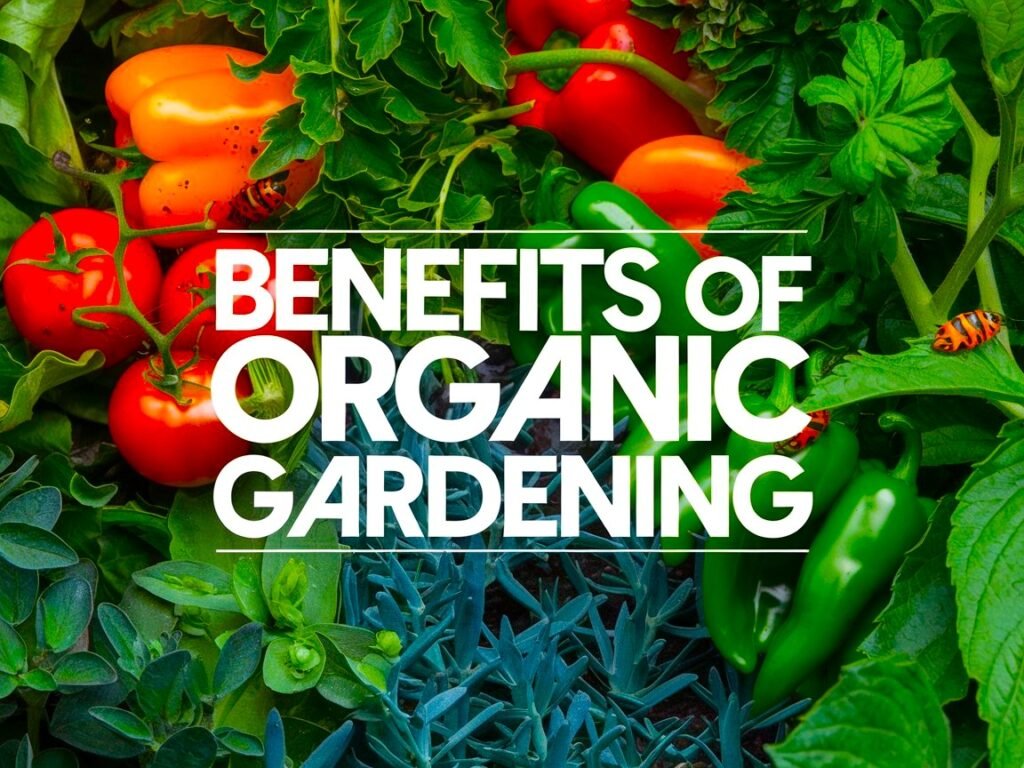Introduction
Organic gardening is not a fad; it is workable to bring up a healthy garden while serving Mother Nature. To the hobbyist, organic gardening is entertaining and quite rewarding as it reconnects people to nature. But what are the actual benefits of organic gardening? Let us get down to it as to why this eco-friendly method is worth embracing.
What is Organic Gardening?
Organic farming is farming without the use of synthetic fertilizers, pesticides, or genetically modified organisms. In their stead come composting, crop rotation, and biological methods of pest control-essentially those that are in tune with nature and very sustainable.

The 10 Key Benefits of Organic Gardening
1. Healthier Food and Lifestyle
Organic produce does not contain any form of harmful chemicals or artificial additives, which means much safer and healthier food for you and your family. There will be excellent promotion of physical activities – gardening itself being one great form of activity.
2. Eco-Friendly Practice
Say goodbye to chemical runoffs! Organic gardening cleans up the pollution of soil and water. It shields the wildlife, maintaining their home unaffected wherein bees and butterflies continue to live uninvaded by chemicals into their homes.
3. Soil Fertility
Healthy soil is the core of organic gardening. Composting, mulching, and natural fertilizers enrich the soil to make it more fertile over time. Healthy soil simply translates to healthy and productive plants!
4. Economical to Garden
Composting, and reusing organic materials, saves money by reducing one’s reliance on store-bought fertilizers and pesticides. Organic gardening can be much cheaper over time.
5. Better Taste and Quality
Homegrown, organic fruits and vegetables taste and have better nutritional value compared to the mass-produced variety available in stores. Because they are not tampered with chemically, the food retains its real taste; hence, every meal is a delight.
6. Reduced Carbon Footprint
Organic composting gardening methods prevent landfills of waste and methane emissions. Growing your fruits and vegetables reduces carbon emissions in transporting the same from store-bought areas.
7. Maintains Biodiversity
Organic gardens serve as a haven for beneficial insects, earthworms, and birds. These facilitate the natural controlling of pests and flowers for the pollination of flowers and maintenance of ecological balance.
8. Improves Mental Health
Indeed, gardens have been found to reduce stress by improving mental well-being; thus, organic gardening, being essentially in direct contact with nature, amplifies this very effect by offering a retreat away from everyday turmoil.
9. Sustainability at Its Core
It is core environmental sustainability wherein, by going organic, you aid in green living, save resources and do not let them waste, and take care of the environment for the years to come.
10. A Learning Curve
Organic gardening itself is, in one sense, a continuing education on soil health to companion planting, it is testing one’s ability to learn with the plants.
To learn more about organic pest control visit this post

Getting Started Organic Gardening Tips
- Start Small: Start with some vegetables that are relatively uncomplicated to cultivate, like herbs, lettuce, or tomatoes.
- Make Compost: With the use of kitchen scraps and yard waste, make nutrient-rich compost.
- Avoid Chemicals: Instead, use neem oil or plant marigolds to naturally help deter pests.
- Test Your Soil: Check your soil’s pH and nutrient levels to see what your garden lacks.
Conclusion
Organic gardening is not about the plants; rather, it’s a way to nurture a healthier lifestyle and the environment for a better future. Whether one is a well-seasoned hobbyist or just getting started, organic gardening has all the reasons to make the journey worthwhile. Buckle up your gloves, let’s get dirty, and grow greener tomorrow! Learn more about organic gardening methods and benefits at the Rodale Institute.
FAQ: Benefits of Organic Gardening
Q: What is organic gardening?
A: Organic gardening is a way of raising plants without synthetic fertilizers, pesticides, or GMOs. It focuses on natural and ecologically viable modes of operation, such as composting and crop rotation.
Q: Why is organic gardening good for the environment?
A: Organic gardening prevents soil and water pollution, maintains biodiversity, and limits the harmful use of chemicals that destroy life in ecosystems.
Q: Does organic produce taste any better?
A: Yes! Organic fruits and vegetables have more flavor because they are grown naturally without chemical interference.
Q: Is organic gardening cost-effective?
A: Absolutely! Organic gardening saves you money by reusing natural resources, making your compost, and avoiding the use of expensive synthetic fertilizers.
Q: How does organic gardening benefit mental health?
A: Organic gardening relieves a lot of stress, increases the ability to focus on something, and gives a sense of satisfaction by growing plants while merging with nature.
Q: What are some tips useful for organic gardening beginners?
A: Start small with easy crops like herbs or lettuces, prepare compost yourself, avoid using chemical pesticides, and test your soil for perfect growth.



